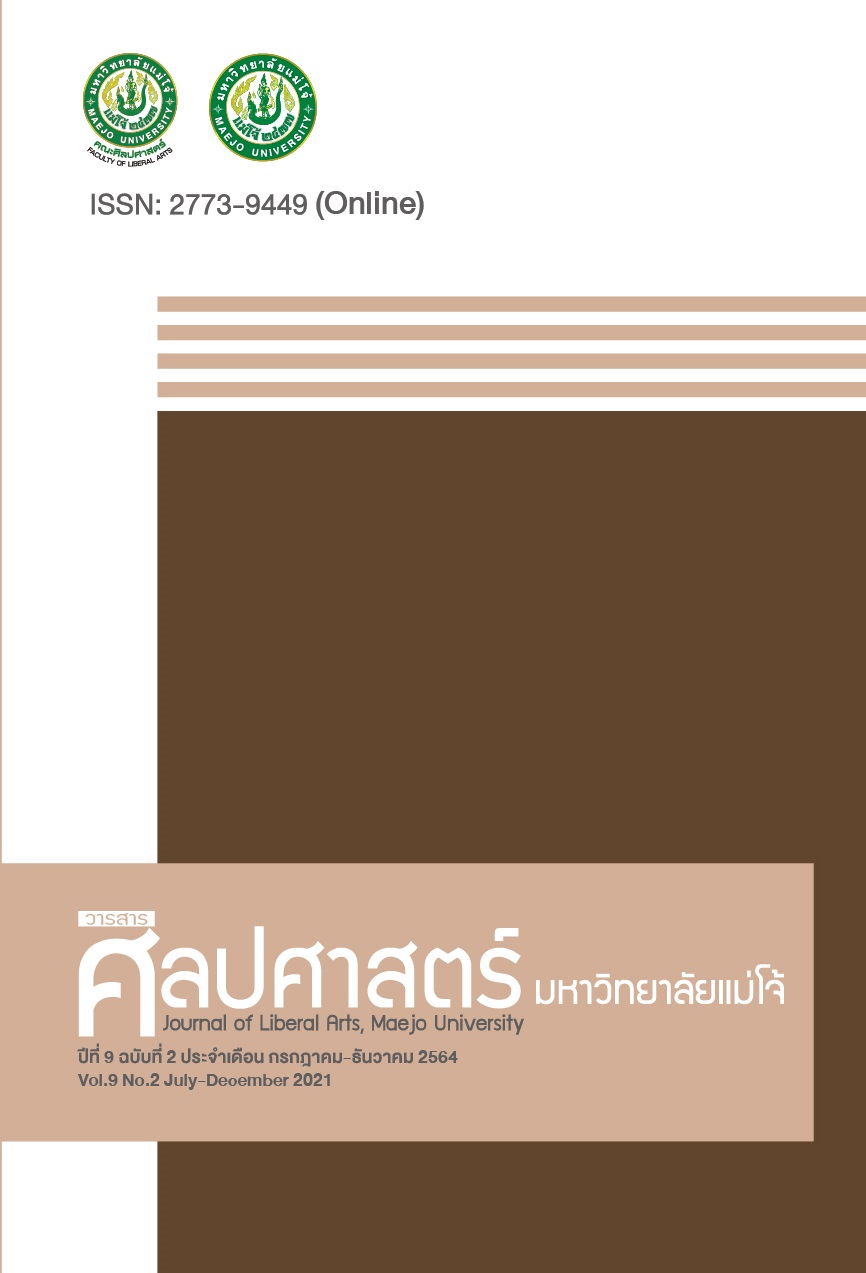Social Entrepreneurship of Tai in Ban Luang Community, Mae Hong Son Province
Main Article Content
Abstract
This research article aims to (1) understand processes of social working and social working experiences of social entrepreneurs, and (2) study the conditions to become social entrepreneurs of Tai in Ban Luang community through the concept of social entrepreneurship. Researcher selected “Ban Luang community”, Ban Luang, Moo.8, and Ban Taupae, Moo.1, Mae Ngao sub-district, Khun Yuam district, Mae Hong Son province, as the study area, and gathered data during July and December 2020. In order to study social working experiences and conditions to become social entrepreneurs, researcher interviewed with five homestay social entrepreneurs in Ban Luang community. In addition, by accidental sampling, questionnaires were distributed to 100 household sample (Ban Luang 35 household representatives and Ban Taupae 65 household representatives) to study community problems, satisfaction of Tai villagers towards homestay businesses, and cultural network creation and participation of Tai villagers towards homestay businesses in the community. The research findings indicate different ways of life and social working experiences of five social entrepreneurs (e.g., community leader, village committee, NGO staff, community rights activist) as inspirations of social entrepreneurs to aware social problems. Some Tai villagers in Ban Luang community transformed themselves into homestay social entrepreneurs by depending on five conditions: (1) awareness of social problems in the community, (2) social working experiences, (3) knowledge of social enterprise (homestay business) and government support, (4) social network creation and participation of Tai villagers, and (5) readiness of house and family.
Article Details
References
กรมการพัฒนาชุมชน. (2562). รายงานข้อมูลจปฐ. ปีพ.ศ. 2562. สืบค้น 21 เมษายน 2563, จาก http://ebmn.cdd.go.th/#/jpt/report
กรีนไลฟ์พลัส แมกกาซีน. (2560). ความแตกต่างระหว่าง Social Enterprise และ Social Entrepreneur. สืบค้น 28 เมษายน 2562, จาก http://www.greenlifeplusmag.com/archives/5401
เกวลิน มะลิ. (2557). กิจการเพื่อสังคมในประเทศไทย. วารสารเศรษฐศาสตร์และกลยุทธ์การจัดการ, 1(2), 104 – 112.
โครงการสืบค้นและจัดการมรดกทางวัฒนธรรมอย่างยั่งยืนในอำเภอปาย-ขุนยวม-ปางมะผ้า. (2551). เอกสารประกอบโครงการเสาวนาเวทีชาวบ้าน “มรดกอดีตและปัจจุบันของขุนยวม”. สำนักงานกองทุนสนับสนุนการวิจัย (สกว.) และ มหาวิทยาลัยศิลปากร.
จตุพร จุ้ยใจงาม และพรชัย เทพปัญญา. (2557). กิจการเพื่อสังคม แนวโน้มระบอบทุนนิยมสมัยใหม่กรณีศึกษาที่ประสบความสำเร็จ. วารสารวิชาการ Veridian E-Journal, 7(1), 124 – 137.
จตุรงค์ นภาธร. (2561). การบริหารทรัพยากรมนุษย์ของกิจการเพื่อสังคมในประเทศไทย: กรณีศึกษาของกาแฟดอยช้างและโครงการพัฒนาดอยตุง. จุฬาลงกรณ์ธุรกิจปริทัศน์, 40(156), 26 – 56.
นิตนา ฐานิตธนกร. (2554). Social Enterprise: ธุรกิจแห่งการสร้างสรรค์สังคม. วารสารนักบริหาร, 31(2), 30 – 35.
มรกต กำแพงเพชร. (2553). ผู้ประกอบการไทยในยุคเศรษฐกิจสร้างสรรค์. FEU Academic Review, 3(2), 52 – 56.
มิวเซียมไทยแลนด์. (ม.ป.ป.). ต้องรู้ ต้องลาย การต้องลายโลหะของชาวเชียงใหม่. สืบค้น 20 มกราคม 2564, จาก https://www.museumthailand.com/en/3080/storytelling/ต้องรู้ ต้องลาย
ปกรณ์ คงสวัสดิ์. (2552). ประชาพิจารณ์ “ของแท้” คนขุนยวมกับประวัติศาสตร์และการจัดการมรดกทางวัฒนธรรมท้องถิ่น. สืบค้น 21 มกราคม 2564. จาก https://lek-prapai.org/home/view.php?id=550
ประพิน นุชเปี่ยม, ติญทรรศน์ ประทีปพรณรงค์ และบงกช เจนรัสสกุล. (2561). วิสาหกิจเพื่อสังคมในประเทศไทย: ข้อสังเกตบางประการต่อพระราชบัญญัติส่งเสริมวิสาหกิจเพื่อสังคม. วารสารผู้ตรวจการแผ่นดิน, 11(1), 109 – 141.
พระราชกฤษฎีกาออกตามความในประมวลรัษฎากรว่าด้วยการยกเว้นรัษฎากร (ฉบับที่ 621) พ.ศ. 2559. (2559, 30 สิงหาคม). ราชกิจจานุเบกษา. เล่ม 133 ตอนที่ 76 ก. หน้า 13 – 16.
พระราชบัญญัติส่งเสริมวิสาหกิจเพื่อสังคม พ.ศ. 2562. (2562, 22 พฤษภาคม). ราชกิจจานุเบกษา. เล่ม 136 ตอนที่ 67 ก. หน้า 32 – 56.
พสุ เดชะรินทร์. (2552). ผู้ประกอบการเพื่อสังคม. สืบค้น 16 มิถุนายน 2562, จาก http://www.volunteerspirit.org/?p=25147
ระเบียบสำนักนายกรัฐมนตรีว่าด้วยการสร้างเสริมกิจการเพื่อสังคมแห่งชาติ พ.ศ. 2554. (2554, 18 พฤษภาคม). ราชกิจจานุเบกษา. เล่ม 128 ตอนพิเศษ 55 ง. หน้า 1 – 4.
ศรัญญิการ์ เทียมบุญกิจ. (2559). การพัฒนาการประกอบการทางสังคม: หลักการ แนวคิด คุณลักษณะ บทบาท และปัจจัยที่มีผลต่อความสำเร็จของธุรกิจเพื่อสังคมในประเทศไทย. วารสารวิชาการ สถาบันการพลศึกษา, 8(1), 135 – 146.
สมเกียรติ สกุลสุรเอกพงศ์. (2558). คุณลักษณะผู้นำในกิจการเพื่อสังคมในประเทศไทย. วารสารสำนักบัณฑิตอาสาสมัคร, 12(1), 63 – 84.
สุภาภร ภิญโญฉัตรจินดา. (2561). การวิเคราะห์การเป็นผู้ประกอบการทางสังคมของผู้ประกอบการในเขตประกอบการสวนอุตสาหกรรมโรจนะ จังหวัดอยุธยา. Veridian E-Journal, Silpakorn University, 11(1), 662 – 678.
สภาปฏิรูปแห่งชาติ. (2558). สภาปฏิรูปแห่งชาติ วาระพิเศษ 1: วิสาหกิจเพื่อสังคม. กรุงเทพฯ: สำนักงานเลขาธิการสภาผู้แทนราษฎร.
อำนาจ ธีระวนิช. (2549). ผู้ประกอบการ. กรุงเทพฯ: มาเธอร์ บอส แพคเก็จจิ้ง.
อำพล ชะโยมชัย. (2560). ลักษณะความเป็นผู้ประกอบการทางสังคมขององค์กรและนวัตกรรมเชิงสังคมที่มีต่อความยั่งยืนทางเศรษฐกิจขององค์กรธุรกิจในประเทศไทย. สุทธิปริทัศน์, 31(99), 188 – 205.
Abu-Saifan, S. (2012). Social Entrepreneurship: Definition and Boundaries. Technology Innovation Management Review, 22 – 27.
Brouard, F., & Larivet, S. (2010). Essay of Clarifications and Definitions of the Related Concepts of Social Enterprise, Social Entrepreneur and Social Entrepreneurship. In Fayollye, A., & Matlgy, H. (Eds.), Handbook of Research in Social Entrepreneurship (pp. 29 – 56). Chelelham: Edward Elgar Publishing.
Leadbeater, C. (1997). The Rise of the Social Entrepreneur. London: Demos.
Schumpeter, J. A. (1961). The Theory of Economic Development: An Inquiry into Profits, Capital, Credit, Interest, and the Business Cycle. New York: Oxford University Press.
Singh, N. (2015). Social Entrepreneurship in India and the Development Question: A Sociological Perspective. Conference Paper in Eleventh Biennial Conference on Entrepreneurship, at Entrepreneurship Development Institute of India, Ahmedabad, Gujrat, India, 1 – 16.
Taymans, A. C. (1951). Marx’s Theory of the Entrepreneur. The American Journal of Economics and Sociology, 11(1), 75 – 90.
สัมภาษณ์
1) พี่นิสิต (นามสมมุติ), ผู้ประกอบการเพื่อสังคม, บ้านต่อแพ ตำบลแม่เงา อำเภอขุนยวม จังหวัดแม่ฮ่องสอน, 14 พฤศจิกายน 2563
2) พี่เพ็ญ (นามสมมุติ), ผู้ประกอบการเพื่อสังคม, บ้านต่อแพ ตำบลแม่เงา อำเภอขุนยวม จังหวัดแม่ฮ่องสอน, 12 ธันวาคม 2563
3) พี่กิ่ง (นามสมมุติ), ผู้ประกอบการเพื่อสังคม), บ้านต่อแพ ตำบลแม่เงา อำเภอขุนยวม จังหวัดแม่ฮ่องสอน, 15 ธันวาคม 2563
4) พี่แก้ว (นามสมมุติ), ผู้ประกอบการเพื่อสังคม, บ้านหลวง ตำบลแม่เงา อำเภอขุนยวม จังหวัดแม่ฮ่องสอน, 30 พฤศจิกายน 2563

